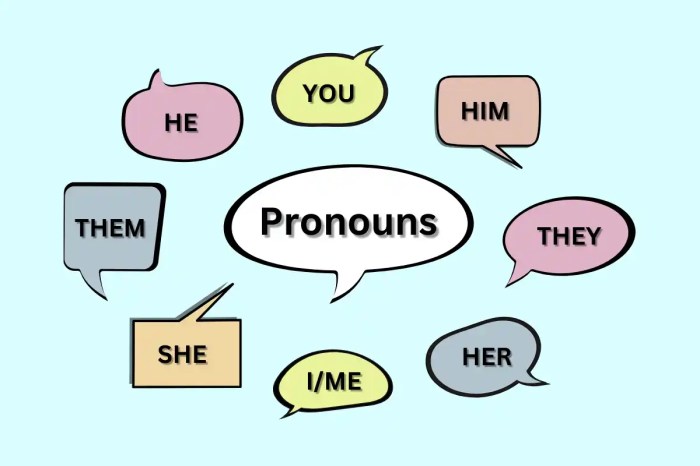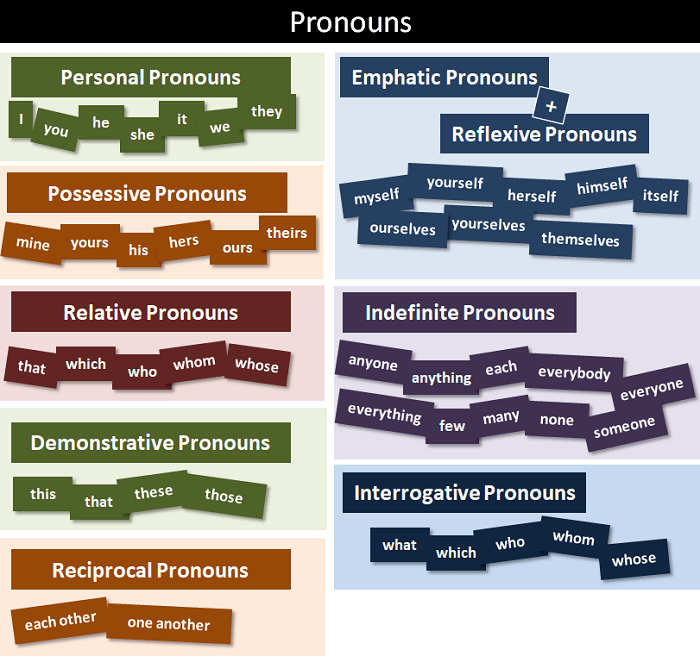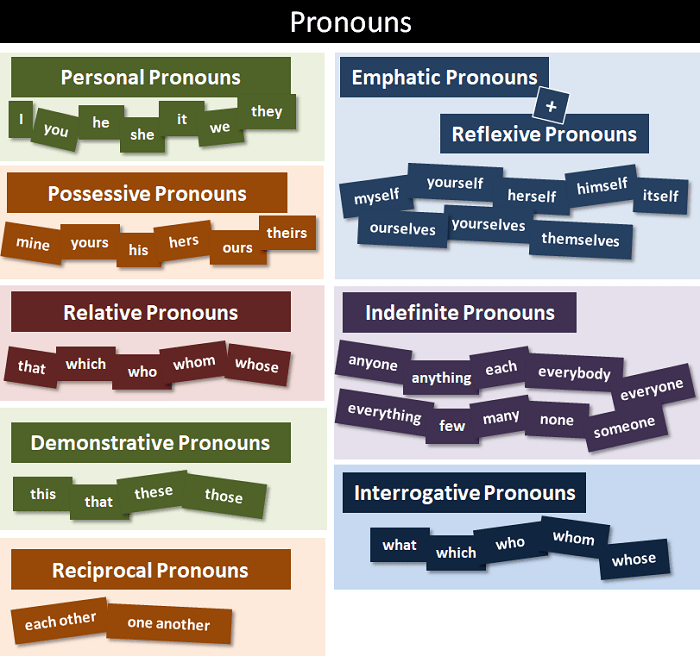How pronouns can affect the quality of your relationships is a crucial aspect of building healthy connections. From romantic partnerships to familial bonds, and even platonic friendships, the way we use pronouns can significantly impact communication, understanding, and respect. This exploration delves into the importance of using correct pronouns, the potential for miscommunication when they’re not respected, and how mindful pronoun usage fosters deeper connections and inclusivity.
We’ll examine different pronoun sets, discuss the impact on various relationship types, and explore strategies for navigating potential challenges. Understanding the power of pronouns empowers us to build more respectful and meaningful relationships, ultimately leading to a more inclusive and empathetic world.
Understanding Pronoun Usage in Relationships
Pronouns, seemingly small words, play a surprisingly large role in shaping communication and fostering connection within relationships. Their usage, or lack thereof, can signal respect, inclusivity, and understanding, or conversely, exclusion and discomfort. Beyond simply replacing nouns, pronouns carry significant social and emotional weight, influencing how individuals perceive and interact with each other.Choosing the right pronouns is a fundamental aspect of building and maintaining healthy relationships, regardless of their type.
It demonstrates respect for an individual’s identity and acknowledges their lived experience. Failing to use the correct pronouns can be hurtful and dismissive, creating a barrier to meaningful connection.
Different Pronoun Sets and Their Impact
Pronoun sets vary widely, encompassing singular and plural options. Some individuals use traditional masculine and feminine pronouns, while others utilize neutral or non-binary options like they/them. This diversity reflects the vast spectrum of gender identities and expressions present in society. Understanding this variety is crucial for fostering inclusive communication.For instance, using “he” or “she” when referring to someone who identifies as non-binary can be jarring and dismissive.
Conversely, using the correct pronouns, such as “they/them,” demonstrates respect and recognition of their identity. This simple act can significantly impact the overall tone and quality of interaction.
Pronoun Usage in Different Relationship Contexts
Pronoun usage varies depending on the nature of the relationship. In romantic relationships, using the correct pronouns signals intimacy and respect for one’s partner’s identity. In familial settings, pronoun use can foster understanding and acceptance within the family unit. Even in platonic friendships, using the correct pronouns is crucial for building a sense of belonging and trust.
- Romantic Relationships: Using the correct pronouns demonstrates intimacy and respect. For example, referring to a partner by their preferred pronouns instead of assuming their gender identity, conveys care and understanding.
- Familial Relationships: Using correct pronouns in family settings fosters inclusivity and demonstrates acceptance of family members’ chosen identities.
- Platonic Relationships: Using the correct pronouns in friendships strengthens bonds by acknowledging each other’s identity. It reinforces a sense of belonging and trust.
Inclusive vs. Exclusive Pronoun Usage
| Aspect | Inclusive Pronoun Usage | Exclusive Pronoun Usage |
|---|---|---|
| Communication Style | Respectful, attentive, and considerate. | Dismissive, dismissive, and insensitive. |
| Relationship Dynamics | Stronger connections and mutual understanding. | Tensions and misunderstandings, potentially damaging the relationship. |
| Impact on the Individual | Creates a safe and supportive environment. | Creates feelings of exclusion and isolation. |
| Overall Tone | Warm, friendly, and supportive. | Cold, impersonal, and unwelcoming. |
This table highlights the stark contrast between inclusive and exclusive pronoun usage. Inclusive pronoun usage fosters a positive and respectful environment, while exclusive usage can be hurtful and damaging.
Importance of Asking About Preferred Pronouns
Asking about someone’s preferred pronouns is not only respectful but also crucial for building healthy relationships. It signals an openness to learning and understanding, and demonstrates a willingness to adapt communication styles to ensure inclusivity. Failing to ask can lead to unintentional misgendering, causing hurt and discomfort.
“Asking about someone’s pronouns is a simple act that can have a profound impact on building a supportive and inclusive environment.”
By taking the time to ask and actively listen, individuals can demonstrate their commitment to creating a welcoming space for all. Not doing so can be perceived as disrespectful, potentially damaging the relationship and creating an environment where individuals feel excluded or uncomfortable.
Impact on Communication and Understanding
Respecting pronouns is more than just a nicety; it’s a crucial component of effective communication and fostering understanding in any relationship. Proper pronoun use demonstrates a fundamental level of respect for a person’s identity, which, in turn, creates a foundation for open and honest dialogue. Ignoring or misusing pronouns can lead to significant misunderstandings and hinder the development of meaningful connections.Misusing someone’s pronouns isn’t just a minor social faux pas; it creates a barrier to communication and can significantly impact how a person feels understood and accepted.
This can lead to feelings of isolation, discomfort, and even alienation. Conversely, using the correct pronouns affirms a person’s identity and builds a stronger connection. This fosters a sense of belonging and acceptance, making the relationship more positive and supportive.
Potential for Miscommunication
Misusing someone’s pronouns can lead to a variety of misunderstandings, from simple confusion to feelings of offense and rejection. For instance, if someone consistently refers to a person using the wrong pronoun, it can create a sense of being invalidated or ignored. This can lead to strained communication and a lack of trust. In situations where individuals are unsure of the correct pronouns, asking respectfully can prevent mishaps.
Impact on Sense of Belonging
Using correct pronouns fosters a strong sense of belonging and acceptance. It demonstrates that a person is valued and respected for who they are. This affirmation can lead to increased confidence and comfort in interactions, making it easier for individuals to express themselves openly and honestly. Conversely, the use of incorrect pronouns can create a sense of exclusion and isolation, making it difficult to build trust and rapport.
Impact on Different Relationship Types
The impact of pronoun usage varies depending on the type of relationship. In romantic relationships, using the correct pronouns helps build trust and intimacy. This allows for deeper emotional connection and stronger communication. In familial relationships, respecting pronouns is crucial for creating a safe and supportive environment where everyone feels seen and heard. This creates a sense of unity and understanding within the family unit.
In professional settings, using correct pronouns demonstrates respect for colleagues and fosters a more inclusive and productive work environment.
Role of Pronouns in Creating a Safe Environment
Using the correct pronouns is vital in creating a safe and respectful environment. It signifies acceptance and validates a person’s identity. This creates a space where individuals feel comfortable expressing themselves and interacting authentically. When pronouns are respected, everyone feels included and valued, regardless of their identity. Ignoring or misusing pronouns sends a message that a person’s identity is unimportant, potentially leading to an unsafe or hostile environment.
Enhancing Empathy and Understanding
Consistent use of correct pronouns fosters empathy and understanding. When individuals actively listen and use the correct pronouns, they demonstrate a genuine interest in understanding others. This active listening helps create a more empathetic environment where individuals are more likely to appreciate different perspectives. This, in turn, enhances communication and builds stronger relationships. For example, consistently using the correct pronouns shows a willingness to learn and adapt, which builds trust and fosters a sense of shared humanity.
Building Respect and Connection Through Pronouns: How Pronouns Can Affect The Quality Of Your Relationships
Using correct pronouns is more than just politeness; it’s a fundamental aspect of respect and connection in relationships. It demonstrates empathy and acknowledges the inherent dignity of every individual. By intentionally and consistently using someone’s chosen pronouns, we create a safe and affirming space where they feel valued and understood. This fosters trust and strengthens the bonds within any relationship.Understanding that pronouns are a vital part of communication is essential.
They are not simply words; they are integral to how we perceive and interact with each other. Correct pronoun usage, therefore, is crucial for building positive and meaningful relationships.
Addressing Someone with Their Preferred Pronouns
Pronoun usage is integral to respectful communication. Using someone’s preferred pronouns consistently demonstrates genuine care and consideration. Here’s a breakdown of how to effectively incorporate this into various situations.
Using the right pronouns is key to building strong relationships, fostering trust and understanding. It’s all about respect, and choosing the right pronoun shows you care. Thinking about how pronouns affect your relationships can be insightful, similar to recognizing the 8 surprising signs you might be a natural-born adventurer, like a deep-seated need for exploration and new experiences.
Ultimately, mindful pronoun use can significantly improve your connections with others, and it’s a simple way to show respect and build genuine bonds.
| Situation | How to Address |
|---|---|
| Introductions | “Hi, I’m [Your Name]. It’s a pleasure to meet you. What are your pronouns?” or “Hello, [Their Name], it’s great to meet you. My pronouns are [Your Pronouns].” |
| Conversations | In ongoing conversations, use their pronouns naturally. If you’re unsure, ask politely, “What are your pronouns?” |
| Social Media | Include their pronouns in your social media bios or introductions. Use their correct pronouns in comments and posts. |
| Written Communication | Use their pronouns consistently in emails, messages, and other written interactions. |
Correcting Yourself When Using Incorrect Pronouns
It’s inevitable that we might make mistakes. The key is to respond with grace and sensitivity when using incorrect pronouns.
- Acknowledge the error: A simple “Oh, sorry, [Their Name]. My apologies. Could you remind me of your pronouns?” demonstrates humility and a willingness to learn.
- Use the correct pronouns: After being corrected, immediately use their correct pronouns going forward. This shows commitment to using their preferred pronouns.
- Don’t dwell on the mistake: Avoid making it a larger issue. Focusing on the correction and moving forward is more important.
Modeling Respectful Pronoun Use
Setting a positive example is crucial in promoting a culture of respect and inclusivity.
- Lead by example: Consistently using people’s correct pronouns, in all your interactions, demonstrates the importance of respecting individual identities.
- Encourage others: If you see someone using someone’s correct pronouns, acknowledge and appreciate it. This encourages others to follow suit.
- Create a safe space: Create an environment where people feel comfortable sharing their pronouns and correcting mistakes with kindness and consideration.
Pronouns and Trust in Relationships
Using someone’s correct pronouns builds trust and rapport in relationships.
- Demonstrates care: It shows you value their identity and well-being.
- Fosters understanding: It helps you connect with them on a deeper level.
- Strengthens relationships: Respectful pronoun use is a key component of healthy and inclusive relationships.
Scenarios Where Pronoun Use is Crucial
Respectful pronoun use is important in a variety of situations.
- Introducing a new partner to family: Use their pronouns consistently during introductions to ensure everyone is aware and respectful.
- Attending social gatherings: Pay attention to the pronouns used by everyone and model respectful behavior.
- Workplace settings: Using correct pronouns fosters a more inclusive and supportive work environment.
Overcoming Challenges and Barriers

Navigating pronoun use in relationships can sometimes present hurdles. Understanding and respecting someone’s pronouns is crucial for fostering a healthy and inclusive environment, but navigating potential challenges requires thoughtful strategies. This section explores strategies for overcoming these barriers, focusing on responding effectively to different situations and creating a safe space for open communication.
Strategies for Unsure or Resistant Individuals, How pronouns can affect the quality of your relationships
Addressing individuals who are unsure or resistant to using correct pronouns requires a gentle and understanding approach. Avoid confrontation or pressure; instead, focus on education and empathy. Repeated, clear communication is key, and providing resources can be extremely helpful. Start by offering clear and concise explanations about the importance of using correct pronouns. Emphasize that using someone’s correct pronouns is a sign of respect and inclusion, not an imposition.
Avoid accusatory language, and instead, frame your communication around your need for respect and understanding.
Using the right pronouns is crucial for healthy relationships, fostering understanding and respect. It’s about recognizing the impact words have on individuals, just like how Steve Jobs, in his early days, revolutionized the tech industry and changed the world with his innovative approach to design and business. This how Steve Jobs started and changed the world demonstrates the power of communication and empathy.
Ultimately, thoughtful pronoun usage reflects a commitment to building stronger connections with others.
Responding to Insensitive or Unintentional Pronoun Use
Dealing with insensitive or unintentional pronoun use necessitates a delicate approach. The goal isn’t to punish, but to educate and guide. A calm and direct response is usually the most effective strategy. If someone uses the wrong pronoun, gently correct them. For example, “My pronouns are she/her,” or “Thank you for using my correct pronouns, they/them.” Avoid emotionally charged language or accusations.
Instead, frame the situation as a learning opportunity. If the individual is genuinely unaware, calmly explain why their pronoun use is problematic. If the error is repeated, you can gently remind them of the correct pronouns.
Creating a Safe Space for Discussing Pronouns
Establishing a safe space for discussing pronouns is paramount for healthy relationships. Open communication, where everyone feels comfortable expressing their needs and concerns, is crucial. Emphasize that pronouns are an integral part of someone’s identity and that respect for these identities is fundamental. Actively listen to the other person’s perspective and acknowledge their feelings. Be patient, and reiterate that the goal is mutual understanding and respect.
Setting clear expectations for pronoun use early in a relationship can create a positive and inclusive environment.
Potential Misunderstandings and Conflicts
Potential misunderstandings or conflicts surrounding pronouns can arise from differing interpretations or lack of awareness. One common source of conflict is the perception that pronoun use is a personal attack or imposition. Another potential source of conflict is differing levels of comfort or familiarity with the concept of pronouns. Addressing these potential conflicts requires clear communication, patience, and a willingness to understand differing perspectives.
Addressing Discomfort or Apprehension
Addressing discomfort or apprehension around pronouns necessitates empathy and understanding. Recognizing that pronoun use is a relatively new concept for some individuals is crucial. Providing clear and concise explanations about pronouns and their significance is essential. Offer resources that can help individuals understand the importance of respecting pronouns. Emphasize that discomfort is a normal reaction to something new and unfamiliar.
Frame the conversation around respect, inclusivity, and mutual understanding.
Promoting Inclusivity and Awareness
Pronoun usage is a crucial aspect of fostering inclusivity and respect in relationships. By actively educating ourselves and others about the importance of pronouns, we create a more welcoming and understanding environment for everyone. This proactive approach empowers individuals to express themselves authentically and builds stronger connections based on mutual respect.Understanding the significance of pronouns goes beyond simply being polite; it’s about acknowledging and validating the identities of those around us.
Pronoun usage is a powerful tool for building empathy and creating a more inclusive community, both online and offline.
Educating Others About Pronoun Use
A crucial step in promoting pronoun awareness is educating others about the importance of using correct pronouns. This involves providing clear and accessible information about the impact of pronoun use on individuals and relationships. It’s about creating a culture of respect and understanding where everyone feels seen and validated. This includes emphasizing the importance of asking and confirming someone’s pronouns rather than assuming them.
Resources and Tools for Promoting Pronoun Awareness
| Context | Resources/Tools |
|---|---|
| Schools | Workshops for students and teachers, inclusion guidelines in student handbooks, pronoun posters in classrooms, social media campaigns promoting respect. |
| Workplaces | Employee resource groups focused on diversity and inclusion, pronoun-focused training sessions, pronoun stickers on employee badges, inclusive language guidelines in company communication. |
| Communities | Community events and workshops focused on LGBTQ+ awareness, inclusive language resources available on local government websites, partnership with community centers and organizations, online discussion forums dedicated to the topic. |
This table Artikels some resources and tools that can be utilized in various contexts. The specific tools and resources that are most effective will depend on the context and the target audience.
Language and Perceptions
Language plays a significant role in shaping perceptions and attitudes. Using inclusive language, such as consistently using someone’s correct pronouns, fosters a sense of belonging and respect. Conversely, using incorrect or insensitive language can create discomfort and alienation. Understanding the power of language allows us to actively shape the perceptions of others.
Using the right pronouns can really impact how well you connect with others. It’s a small thing, but it shows respect and understanding, which are key to any strong relationship. Learning to compromise, as outlined in this helpful article on 7 ways learning compromise improves all your relationships , is also crucial for building healthy connections. Ultimately, recognizing and respecting someone’s pronouns, like actively listening and being willing to bend a little, builds trust and strengthens bonds in any relationship.
“Language is a powerful tool, and its usage can have a profound impact on the perceptions and attitudes of others.”
Inclusive Language Practices
Examples of inclusive language practices include actively using someone’s stated pronouns in conversations, introducing oneself with pronouns, and correcting oneself if one makes a mistake. It’s important to remember that consistency and respect are key elements in creating a positive and inclusive environment.
- Using someone’s correct pronouns. This demonstrates respect and recognition of their identity. For example, referring to someone as “they/them” if that’s their stated preference, instead of assuming a gendered pronoun.
- Asking for pronouns. A simple “What are your pronouns?” shows respect and allows individuals to share their identity on their terms. This is a fundamental part of creating a safe and welcoming environment.
- Correcting oneself. If one accidentally uses incorrect pronouns, it’s crucial to politely correct the mistake. This shows a commitment to learning and adapting.
- Using inclusive language in written communication. Using gender-neutral language in emails, documents, and social media posts, such as “everyone” or “all participants” demonstrates an understanding of diversity.
These practices demonstrate a commitment to creating an inclusive and respectful environment.
Resources for Pronoun Awareness
- Online resources: Numerous websites, blogs, and social media accounts provide information and support on pronoun usage and gender identity. Examples include the GLAAD website, PFLAG, and relevant articles and posts from other advocacy groups.
- Offline resources: Local community centers, LGBTQ+ organizations, and support groups offer valuable in-person support and resources. Local libraries may also host workshops or provide relevant materials.
These resources provide a wealth of information and support to foster a better understanding of pronoun usage and promote inclusivity.
Illustrative Scenarios and Case Studies

Pronoun usage, while seemingly a small detail, holds significant weight in fostering respectful and inclusive relationships. Understanding how pronouns impact interactions, and how to use them effectively, is crucial for building genuine connections. The following scenarios highlight both positive and negative experiences, demonstrating the profound impact of respectful pronoun use.
Positive Interaction: Respectful Pronoun Use
A colleague, Sarah, introduced herself at a company meeting. “Hi, I’m Sarah, and I use she/her pronouns.” The other team members, recognizing the importance of inclusivity, made a conscious effort to use Sarah’s correct pronouns throughout the meeting. This simple act created a comfortable and respectful atmosphere. The positive energy and open communication fostered by this simple act made the meeting more productive and engaging.
Sarah felt valued and respected, leading to a more collaborative and supportive environment.
Negative Interaction: Incorrect Pronoun Use
During a volunteer project, Mark, who uses he/him pronouns, was repeatedly misgendered by a team member. This constant misgendering made Mark feel uncomfortable and disrespected. It created a barrier to open communication and collaboration, and undermined his sense of belonging within the group. The experience highlighted the impact of pronoun use on individual feelings of validation and acceptance.
Diverse Pronoun Usage Across Relationships and Cultures
| Relationship Type | Pronoun Usage Example | Cultural Considerations |
|---|---|---|
| Family | “My son, Liam, uses they/them pronouns.” | Cultural norms around gender expression and family dynamics can influence pronoun usage within families. |
| Friendships | “Hey, my best friend, Alex, prefers ze/hir pronouns.” | Friendship circles may exhibit varied norms for pronoun usage depending on the group’s values. |
| Workplace | “Please address me as ‘Mx.’ followed by my last name.” | Professional settings often demand clear and respectful communication, including pronoun usage. |
| Online Communities | “I’m Amelia and my pronouns are she/her.” | Online platforms often have specific guidelines for pronoun usage, which can influence interaction styles. |
This table demonstrates the diverse range of pronoun usage in various relationships and contexts, highlighting the need for sensitivity and awareness in different situations.
Impact of Pronoun Use in Specific Relational Contexts
Pronoun use significantly impacts interactions in different environments. In the workplace, respecting pronouns can foster a more inclusive and collaborative atmosphere. Volunteer groups benefit from respectful communication, creating a supportive and welcoming environment for all members. Online communities thrive on respectful interaction, including the use of correct pronouns, promoting a sense of belonging and safety.
Impact on Personal Identity and Connection
Correct pronoun use is intrinsically linked to a person’s sense of self and connection to others. Using someone’s correct pronouns validates their identity and shows respect. This act of respect fosters a deeper connection, allowing for more genuine and meaningful interactions. Conversely, misgendering can be deeply hurtful, impacting self-esteem and creating a barrier to trust and rapport.
This experience underscores the importance of pronoun use in building authentic relationships.
End of Discussion
In conclusion, how pronouns can affect the quality of your relationships is a powerful reflection of the importance of respect, empathy, and inclusivity. By understanding the nuances of pronoun usage and practicing mindful communication, we can foster deeper connections and build stronger relationships, both personally and professionally. The impact of respectful pronoun use extends far beyond simply being polite; it creates a safe and supportive environment for everyone involved.
This, in turn, enhances understanding, promotes empathy, and fosters a more inclusive and accepting world for all.











